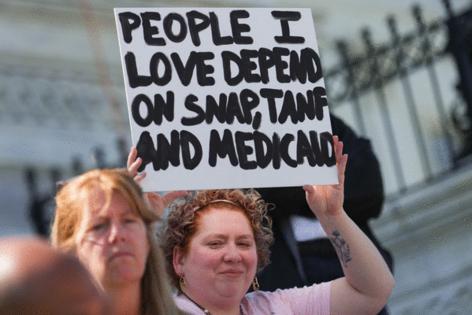Editorial: Republicans missed a shot at serious Medicaid reform
Published in Op Eds
Every decade since the 1970s, Congress has tried and failed to reform Medicaid, the health entitlement for the poor. Republican lawmakers’ latest effort — as part of the One Big Beautiful Bill Act — appears to be no different. Instead of addressing the program’s core deficiencies, the party instead fixated on shrinking it. The likely result? Needless disruption and little in the way of serious savings or reform.
All told, the bill seeks to cut about $1 trillion from federal Medicaid spending over a decade. This savings largely would be achieved through a series of technical changes that nonetheless would be costly and difficult to implement, and thus may not fully materialize.
The most substantial amount in theory would come from adding “work requirements” for beneficiaries. Starting next December, Medicaid recipients under age 65 will need to work, seek employment, go to school or volunteer 80 hours a month, with exemptions for pregnant women, parents with children under 14, the “medically frail” and others. The goal is to save money by shrinking the pool of enrollees — without cutting benefits for those still eligible or dramatically increasing the uninsured rate.
Accomplishing such a delicate task is, you might say, aspirational. States will need to update creaky IT systems and retrain staff. They’ll have to coordinate with the managed-care companies that administer Medicaid plans and communicate changes to a population that’s known to move and change jobs frequently. To show they’re working in good faith and not simply snatching benefits from the poor, officials ought to establish pathways to vocational and other programs that put recipients in compliance with the new rules. They likewise should work with local employers to help those who’ve lost coverage find alternatives.
Preparation of this sort is improbable, and not just because it’s laborious.
Thanks to Medicaid’s funding model, most states have little incentive to strictly comply with work requirements. Since its inception in 1965, Medicaid has offered a federal “match” for state spending on public aid, without a cap. For each dollar a state spends, it gets $1 to $9 from the federal government. By enforcing work rules — and thus lowering their Medicaid spending — states stand to cut off their biggest source of funding, at the risk of yanking away their residents’ health care. Far better to create workarounds.
For these reasons, work requirements are unlikely to generate hoped-for savings. They’ll also hassle the poor while failing to address the perverse incentives of the open-ended federal match that has made Medicaid one of the fastest-growing federal programs, with expenditures soaring to more than $800 billion from about $40 billion in 1985.
Proposals that seek to eliminate the open-ended match have long been debated but remain unpopular. So-called block grants, for example, would allocate a fixed amount of money to states each year. Although that would curb runaway spending, it would be perilously inflexible in times of need — say, when enrollment rises during recessions, disease outbreaks or natural disasters.
One idea that deserves more attention is something of a hybrid. It involves maintaining the uncapped federal match for mandatory benefits and eligibility categories — that is, the core services and populations required by federal law — while setting limits on matching for states’ optional expansions. A split along these lines would make states, rather than federal taxpayers, responsible for spending they choose to incur.
The good news is that the One Big Beautiful Bill has started a long-overdue conversation on Medicaid reform. The bad news is that, as things stand, the cuts the law has imposed are likely to result in disruptive yet ineffective change. Congress still has a chance to do the right thing.
_____
©2025 Bloomberg L.P. Visit bloomberg.com/opinion. Distributed by Tribune Content Agency, LLC.

























































Comments